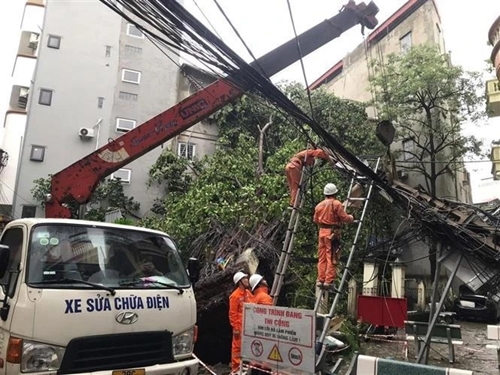Chairing a hybrid conference in Hanoi on September 8 to direct recovery efforts, PM Chinh described Yagi as the most powerful typhoon to enter the East Sea (aka South China Sea) in the past three decades, with an unpredictable escalation, prolonged duration and widespread impact. Despite pro-active and drastic response by various sectors and localities, its complicated progression still resulted in significant damage in human and property.
    |
 |
|
The power sector's workers are restoring electricity grid ruined by the typhoon. |
He conveyed condolences and sympathy of Party General Secretary and President To Lam, other Party and State leaders, to the affected families, units and localities. The PM announced that he and Deputy Prime Ministers would personally visit affected areas to oversee recovery efforts following the conference.
PM Chinh instructed sectors and localities to conduct thorough assessments of fatalities, injuries, missing persons, and material damage to ensure timely assistance.
The PM stressed the importance of providing essential aid, including food, clothes, and shelters to those in need. Additionally, he ordered the swift restoration of electricity, water, telecommunications, and other vital services to facilitate management, production and consumption.
Other specific tasks were also assigned to relevant ministries, agencies and localities.
Typhoon Yagi has left nine people dead and 187 others injured in several northern provinces, according to initial statistics reported as of September 8 morning.
According to the Vietnam Disaster and Dyke Management Authority under the Ministry of Agriculture and Rural Development, 25 small boats sank at their moorings in Quang Ninh. The provinces of Quang Ninh, Thai Binh and Hai Duong, Hai Phong city and the capital city of Hanoi experienced widespread power outage and communication disruption.
Due to the prolonged duration and intensity of the typhoon's strong winds and gusts, 3,279 houses were damaged; 401 power poles were broken. Many stores, offices, and schools were unroofed or damaged. Numerous billboards and telecommunication poles were pulled down; and urban trees were uprooted or broken along major roads in Quang Ninh, Hai Phong, Hai Duong, Hanoi, and other areas.
Agricultural production has also suffered significant damage, with 121,500 hectares of rice and crops submerged or destroyed and over 1,000 aquaculture cages damaged or washed away, primarily in Quang Ninh.
Although the typhoon has weakened into a tropical depression and is dissipating in the northwestern region, its remnants are expected to bring heavy rainfall to Northern provinces until the end of September 9, particularly in the northwest, with average rainfall ranging from 100-200mm and local amounts reaching up to 350mm. Consequently, in addition to recovery efforts, localities must remain vigilant against flash floods and landslides.
Source: VNA